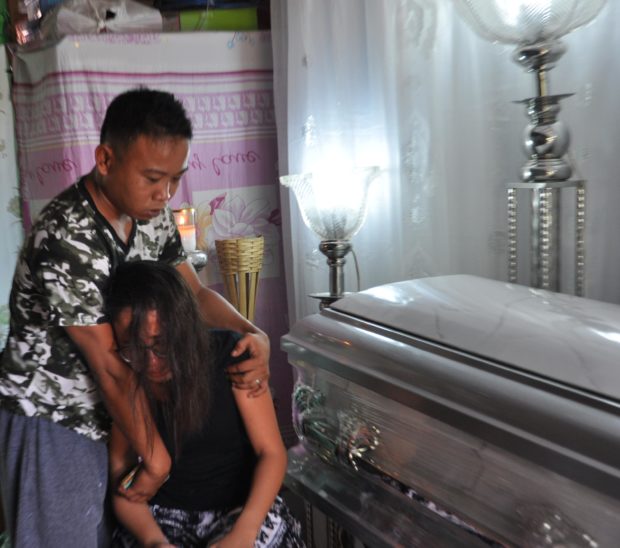
Lovely Jane Dayag grieves before the casket of her mother, slain overseas Filipino worker Constancia Lago-Dayag. The remains of the OFW were shipped home to the Isabela town of Angadanan on May 25. INQUIRER FILE PHOTO / VILLAMOR VISAYA Jr.
MANILA, Philippines — The Commission on Human Rights (CHR) has called on the government to review its agreements with countries where overseas Filipino workers (OFWs) were either attacked or killed.
CHR Spokesperson Jacqueline de Guia said on Tuesday that government action should ensure that the death of Constancia Dayag in Kuwait and the alleged maltreatment of another OFW in Saudi Arabia would not happen again.
“These fresh incidents of grim fate and maltreatment of OFWs, particularly in the Middle East, once again stress the need for the review of agreements with the said countries to guarantee non-repetition and to improve working conditions,” De Guia said.
“We express our deepest sympathies and send our prayers to the family and friends of Constancia. The CHR also hopes to provide support for [the maltreated OFW] as she recovers from the trauma she suffered. Expedient reforms need to be put in place to ensure that no OFW will suffer the same fate,” she added.
Dayag, 47, was found dead inside her employer’s house on May 14. Bruises and contusions on her body and other injuries suggest that she was sexually assaulted before dying.
READ: Remains of Filipina who died in Kuwait to arrive in PH
The household worker’s body has been brought back to the Philippines on May 24. According to the Department of Foreign Affairs (DFA) and the Philippine Embassy in Kuwait, the government agencies have already filed a criminal case in behalf of Dayag’s relatives.
The Department of Labor and Employment on the other hand has asked the National Bureau of Investigation to conduct a second autopsy on Dayag’s body.
READ: DFA files criminal case for death of OFW in Kuwait
READ: DOLE asks NBI for second autopsy on slain OFW
CHR said that these are welcome developments, although they encouraged DFA to guarantee quick response for OFWs who may be in dire situations.
“We welcome the move of the Department of Foreign Affairs to file criminal charges against the employers of Constancia. But more than this, quick response needs to be guaranteed for urgent distress calls or signs of maltreatment to prevent the worst from happening,” De Guia noted.
“We have also previously recommended for stricter monitoring of all OFWs as a preventive measure for human rights abuses and modern-day slavery,” she added.
The commission on the other hand asked the foreign governments where OFWs were abused to provide concrete solutions in protecting the rights of migrant workers.
“The countries where violations repeatedly occur must be able to provide positive and concrete measures to protect the rights of Filipino migrant workers,” De Guia explained.
“The Migrant Workers’ Act or R.A. 10022 specifically indicates that the government allow the deployment of OFWs only in countries where their rights are protected without compromise. Access to justice, emergency response, psychosocial, and medical treatment must also be guaranteed by the labor-receiving country especially for aggrieved OFWs,” she said.
Reports of abusive employers in some middle eastern nations have been rampant, prompting the government to reconsider sending workers to these countries.
READ: Duterte: OFW ban to Kuwait permanent
Duterte eventually lifted the ban three months after. (Editor: Jonathan P. Vicente)
RELATED STORIES
Duterte orders lifting of OFW deployment ban to Kuwait
OFW wins case after rape attempt in UAE; urges Filipino victims to speak up
PH issues total ban on deployment of Filipino workers to Kuwait
Duterte says gov’t seeking end to abuses vs OFWs